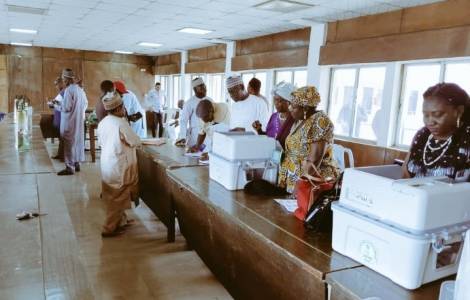
Abuja (Agenzia Fides) - "We have had this democratic system for 25 years, but what have we achieved? We should be free to decide who should govern us or represent us at any level", says Archbishop Lucius Iwejuru Ugorji, President of the Nigerian Bishops' Conference of Owerri, following the election of governors of three (of Nigeria's 36) states. The bitter remark by the President of the Bishops' Conference is shared by many in Nigeria. The so-called “off-cycle elections”, i.e. elections outside the normal election cycle, in which votes are cast for federal and state bodies, date back to 1999, when the then military dictatorship gave way in favor of a return to democracy. It was expected that elections would be held regularly every four years throughout the Federation, but after the 1999 elections, numerous candidates challenged the results of the elections in court in many states. This led to the electoral courts removed some governors and ordered new elections. After the 1999 election, eight states held elections outside the normal election cycle. Last November 11, Governorship elections were held in Kogi (centre), Bayelsa (south) and Imo (southeast) states. President Bola Ahmed Tinubu's All Progressives Congress (APC) party won in Kogi and Imo, while the opposition People's Democratic Party (PDP) won in Bayelsa. Voter turnout was low after violence marked the election campaign, discouraging many voters from going to the polls. Although the police mobilized up to 92,565 police officers, including 27,000 in Bayelsa, 25,565 in Imo and 40,000 in Kogi, supported by helicopters, serious violence occurred. In Imo State, the leader of the Labor Party and a party member were beaten; in Bayelsa, shootings and killings were reported before and during the elections. Elsewhere, some officials of the Independent Electoral Commission were taken hostage, while in Kogi State, some people were found with pre-filled ballot papers ahead of the election, leading to the cancellation of elections at some polling stations. Numerous logistical problems, vote buying and collusion between government officials, security officials and election workers were reported. Proponents of "off-cycle elections" had stressed that these helped identify and correct the distortions in the electoral system, but it turned out that this was not the case, so former President Goodluck Jonathan proposed an amendment to the constitution called for to prevent elections outside the regular cycle. The hunger for money and power of many candidates is seen as the main cause of this situation. “While public office holders should know that power is transitory, our young people should resist the temptation to offer themselves as cannon fodder or as criminals,” underlined Msgr. Ugorji. Cardinal John Olorunfemi Onaiyekan, Archbishop Emeritus of Abuja, expressed similar thoughts. "If the governor were someone who puts himself at the service of the people, there would be no reason for all this. Why are there so many fights for the leadership position?" he wondered. "This is because it is used to glorify people to gain power, which is used for selfish interests instead of using it for the common good," he stressed. (L.M.) (Agenzia Fides, 14/11/2023)